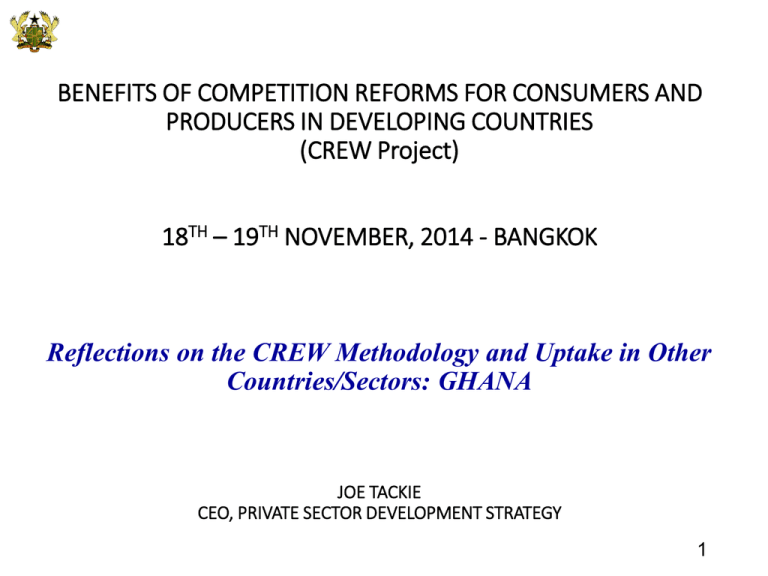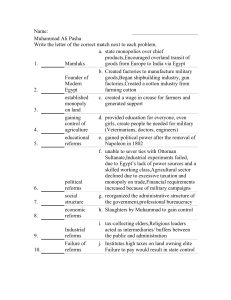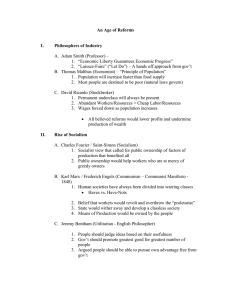BENEFITS OF COMPETITION REFORMS FOR CONSUMERS AND PRODUCERS IN DEVELOPING COUNTRIES 18
advertisement

BENEFITS OF COMPETITION REFORMS FOR CONSUMERS AND PRODUCERS IN DEVELOPING COUNTRIES (CREW Project) 18TH – 19TH NOVEMBER, 2014 - BANGKOK Reflections on the CREW Methodology and Uptake in Other Countries/Sectors: GHANA JOE TACKIE CEO, PRIVATE SECTOR DEVELOPMENT STRATEGY 1 CONTEXT A CLEAR FOCUS ON PRIVATE SECTOR DEVELOPMENT GHANA’S MEDIUM TERM PRIVATE SECTOR DEVELOPMENT STRATEGY II THE VISION A Thriving Private Sector: GOAL To achieve sustainable, equitable and widespread private sector-led growth throughout Ghana PURPOSE To enhance the competitiveness of the private sector A THRIVING PRIVATE SECTOR • That will deliver: Economic transformation - productive, efficiency driven diversified economy Wider economic opportunity – Prosperity for All! Jobs, Incomes, greater regional equity LINK INTO OTHER NATIONAL INITIATIVES NDPC THEMATIC AREAS Macroeconomic stability Competitive Ghana Private Sector Modernised Agricultural & sustainable Natural Resource Management Oil and Gas Development Infrastructure and Human Settlements Development Human Development, Productivity & Employment Transparent and Accountable Governance. PSDS II Sector Strategies MDA Policies/ Initiatives Private Sector Projects Development Partner Projects WHERE WE WANT TO BE 2017 2014 Now (GCI Ranking) Basic requirements • Institutions • Infrastructure • Macroeconomic stability • Health and primary education Efficiency enhancers • Higher education and training • Goods market efficiency • Labour market efficiency • Financial market sophistication • Technological readiness • Market size TRANSITION THE NEED FOR COMPETITION REFORMS COMPETITION POLICY vis-à-vis COMPETITION LAW Competition Policy FDI Policy Trade Policy Industrial Policy Disinvestment Policy All Government Policies that affect the functioning of markets Fiscal Policy IPR Policy Competition Law Labour Policy Procurement Policy ….. Other…… Source: CUTS, 2007 Competition Policy - a broad concept that seeks to harmonise all government policies Competition Reforms, Economic Growth and Poverty Reduction THE RATIONALE FOR COMPETION REFORMS Wealth creation Employment creation (jobs) Participation in mainstream economic activity Innovation, new approaches, higher productivity, technology diffusion The role and contribution of Competition Reforms to economic growth and development Better goods and services Real choices for the poor A Competition Regime enables poor women & men to access goods & services & participate in growth Tax revenues that finance services, increased capabilities of government KEY SUCCESS FACTORS LEADERSHIP SENSE OF URGENCY BEHAVIOURS & ATTITUDE OWNERSHIP SITUATE COMPETITION REFORMS WITHIN EXISTING GOVERNANCE ARRANGMENTS FOR PRIVATE SECTOR DEVELOPMENT THE COUNCIL Chaired by the Presidency GOVERNMENT Pre side ncy & Ministe rs PRIVATE SECTOR Formal & Inf ormal DEVELOPMENT PARTNERS THE BOARD Chaired by a Private Sector Representative PRIVATE SECTOR REPRESENTATIVES MINISTER FOR TRADE & INDUSTRY DEVELOPMENT PARTNERS THE SECRETARIAT H EAD ED BY CH IEF EXECUTIVE OFFICER IMPLEMENTING AGENCIES MDAs Private Sector Service Providers PPP Arrangements GUIDED BY IMPLEMENTATION PRINCIPLES Transparent, evidence based policy making processes. Deepening Understanding for reforms Mutual commitment and accountability Using the capabilities of both the public and private sectors Leadership from the top To undertake reforms Maintaining commitment and drive COMPETITION REFORMS KEY SUCCESS FACTORS: 1. Communication 2. Strengthening Business Associations 3. Role of the Media and CSO 4. Collaboration between Govt., Private Sector and Civil Society 5. Programme of reform supervised by Inter Agency Coordinating Teams 6. Management - Target best brains in the country for credibility 7. Analysis / Recommendations – Persons able to command the respect of all sides THANK YOU





